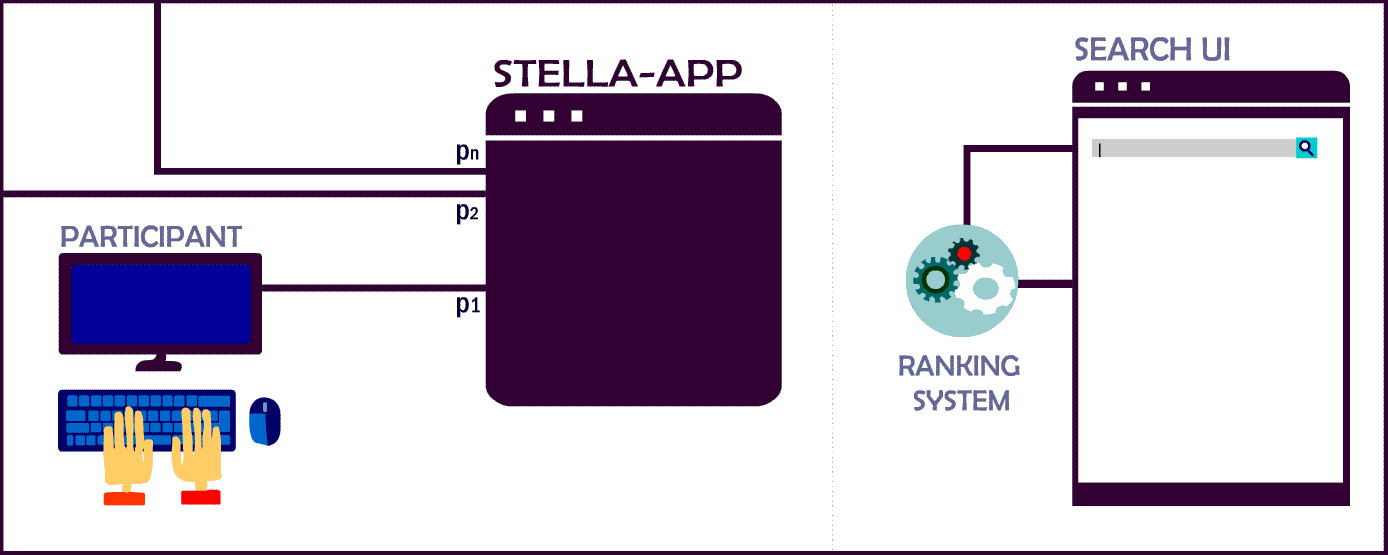This repository provides interested experimenters with a template for integrating their ranking and recommendation systems into the STELLA infrastructure. Currently, the infrastructure supports two different types of submission. Experimenters can choose to submit pre-computed runs with TREC run file syntax OR use this repository in order to integrate their system as a micro-service into the STELLA App. In contrast to pre-computed results, these dockerized systems can deliver more comprehensive search result since they are not limited to pre-selected queries or items.
As a starting point we provide a web-service based on flask in app.py. The classes in systems.py need to be adapted.
Of course, experimenters are not restricted to use Flask or Python at all as long as the resulting Docker containers implement the required REST endpoints and deliver technically correct responses.
We provide tutorials in the form of setup guides and videos. For starters, following one of the provided resources should be enough.
Before starting your implementations, some requirements have to be fullfiled:
- docker: get-started | get docker
- git
- python3
Besides a Python distribution like Anaconda and an IDE like PyCharm can be helpful. Likewise, you should be familiar with virtual environments.
For ranking systems the following endpoint has to be implemented:
GET container_name/ranking?query=<string:qstr>&page=<int:pnum>&rpp=<int:rppnum>
For recommending datasets this endpoint has to be implemented:
GET container_name/recommendation/datasets?itemid=<string:itemidstr>&page=<int:pnum>&rpp=<int:rppnum>
For recommending publications this endpoint has to be implemented:
GET container_name/recommendation/publications?itemid=<string:itemidstr>&page=<int:pnum>&rpp=<int:rppnum>
Whereas the parameters contain the following information:
| Parameter | Explanation |
|---|---|
| query | String-formatted query corresponding to the ranking |
| itemid | Identifier of the target item corresponding to the recommendation |
| page | Number of page |
| rpp | Number of results per page |
Requirements: The submitted system has run in a single Docker container and this repository should be self-contained. As a starting point, please have a look at the Dockerfile.
Before registering your ready-to-be-evaluated system, make sure you run the tests provided in test/.
Beside unit tests, we provide Python scripts to build, run, stop and remove the Docker images/containers.
Once the Docker container is started run either test_ranking, test_recommendation_datasets, or test_recommendation_publications.
Datasets can be retrieved after registration. Experimenters can choose to implement their system with datasets provided by LIVIVO or GESIS. Recommendation systems are going to be deployed at GESIS, whereas ranking systems at LIVIVO.
In order to get access and submit systems, experimenters have to register here. As soon as you have registered, you can submit your system by adding a link to your GitHub repository. After approval your system is ready to be integrated into the STELLA App.
As far as we know, the development process works fine within a UNIX environment. However we received the following feedback from Windows users:
- Instead of using the address
0.0.0.0, it should belocalhostwhen starting flask. - For some Windows users the
docker-sdkdid not work at the first try and a reinstallation of Anaconda could solve the issue.
